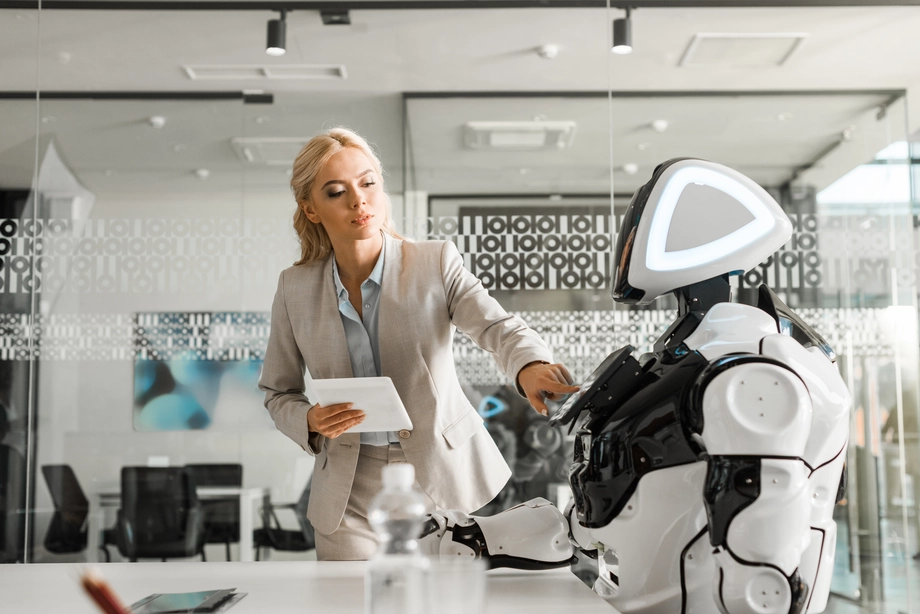The Impact of AI on Human Taking Away Human Jobs
Artificial Intelligence (AI) is no longer a distant concept confined to science fiction; it has become an integral part of industries worldwide. As its adoption accelerates, concerns and opportunities surrounding the workforce have emerged. The intersection of AI and human labor is multifaceted, with profound implications for the future of jobs.
This article explores the nuanced dynamics of this transformation, shedding light on its benefits, challenges, and how we can prepare for the inevitable shifts.
Redefining Work: AI as a Collaborative Tool
 AI’s integration into the workplace has been a game-changer, primarily in augmenting human capabilities rather than replacing them outright. By automating repetitive tasks and enabling data-driven decision-making, AI empowers employees to focus on strategic and creative aspects of their roles.
AI’s integration into the workplace has been a game-changer, primarily in augmenting human capabilities rather than replacing them outright. By automating repetitive tasks and enabling data-driven decision-making, AI empowers employees to focus on strategic and creative aspects of their roles.
For instance:
AI assists doctors in diagnosing diseases through advanced imaging and predictive analytics, enhancing accuracy and reducing human error. Automated algorithms handle fraud detection and portfolio management, allowing financial analysts to concentrate on complex investment strategies. Chatbots and recommendation engines streamline customer service and enhance personalization, improving customer satisfaction.
While AI has undoubtedly increased efficiency, its impact varies across sectors. Industries reliant on manual or repetitive tasks face a higher likelihood of job displacement, while those requiring creativity, critical thinking, and interpersonal skills benefit from AI as a complementary tool.
The Dual-Edged Sword of Automation
Automation is a cornerstone of AI’s impact on jobs. While it drives productivity and reduces costs, it also poses significant challenges for workers in certain sectors.
Job Displacement and Transformation
Many routine and low-skill jobs are at risk of being replaced by machines. According to studies, roles such as data entry clerks, assembly line workers, and telemarketers are among the most vulnerable.
However, the narrative is not solely one of loss:
- Job Creation: The AI revolution has spurred demand for new roles, including data scientists, AI ethicists, and machine learning engineers.
- Upskilling and Reskilling: Organizations are investing in training programs to help workers transition to AI-enhanced roles. For example, a factory worker may shift from operating machinery manually to overseeing AI-driven processes.
Economic Inequality and Labor Market Shifts
The unequal distribution of AI’s benefits could widen the gap between high-skilled and low-skilled workers. Countries and organizations must address these disparities through:
- Policies promoting equitable access to education and technology.
- Public-private partnerships to fund workforce development initiatives.
- Encouraging lifelong learning to keep pace with evolving job requirements.
Ethical Implications and Governance Challenges
The integration of AI into the workforce raises profound ethical questions. Beyond its technical capabilities, AI’s social and economic impact requires careful consideration.
AI algorithms can perpetuate existing biases in hiring or decision-making if not properly designed. Ensuring fairness and transparency is paramount.
Workplace AI tools, such as monitoring software, can encroach on employees’ privacy, necessitating clear regulations.
While AI improves efficiency, there is a risk of creating overly demanding environments where workers must constantly adapt to new technologies.
Governments and organizations must collaborate to establish ethical frameworks that prioritize human dignity and equity. Regulatory measures should also address the accountability of AI systems and their creators.
Preparing for an AI-Driven Future
Adapting to the AI-driven workforce requires a proactive approach from governments, businesses, and individuals. The following strategies can help ensure a smooth transition:
Updating curricula to include AI literacy and fostering skills such as critical thinking, problem-solving, and emotional intelligence will prepare future generations for a dynamic job market.
Embracing remote work, gig opportunities, and hybrid roles can offer employees more adaptability in an AI-enhanced environment.
Governments should expand unemployment benefits, provide universal basic income (UBI) pilots, or create subsidized job opportunities to mitigate short-term disruptions.
The Role of Organizations
Businesses have a pivotal role to play in shaping the future workforce. Investing in employee development and ethical AI adoption ensures a sustainable and inclusive work culture:
- Conducting AI impact assessments to identify risks and opportunities.
- Collaborating with educational institutions to design relevant training programs.
- Promoting a culture of innovation that encourages employees to embrace change.
Conclusion
The impact of AI on human jobs is undeniable, presenting both opportunities and challenges. By leveraging AI as a collaborative tool, addressing ethical concerns, and prioritizing education and reskilling, society can navigate this transformative era with resilience. AI is not the end of human labor but rather a call to redefine and elevate it. The road ahead will require adaptability, foresight, and a commitment to ensuring that technology serves humanity’s best interests.
References
- Brynjolfsson, E., & McAfee, A. (2017). The Second Machine Age: Work, Progress, and Prosperity in a Time of Brilliant Technologies.
- World Economic Forum. "The Future of Jobs Report." WEF Website
- Frey, C. B., & Osborne, M. A. (2013). "The Future of Employment: How Susceptible Are Jobs to Computerisation?"
- Accenture. "AI: Built to Scale." Accenture Report
- McKinsey & Company. "Jobs Lost, Jobs Gained: Workforce Transitions in a Time of Automation." McKinsey Insights
- PwC. "Will Robots Really Steal Our Jobs?" PwC Report
- Harvard Business Review. "The Ethics of Artificial Intelligence." HBR Article
- OECD. "Artificial Intelligence in Society." OECD Report
- MIT Technology Review. "AI and the Future of Work." MIT Review
- Gartner. "AI Hype Cycle and Workforce Implications." Gartner Insights





























































